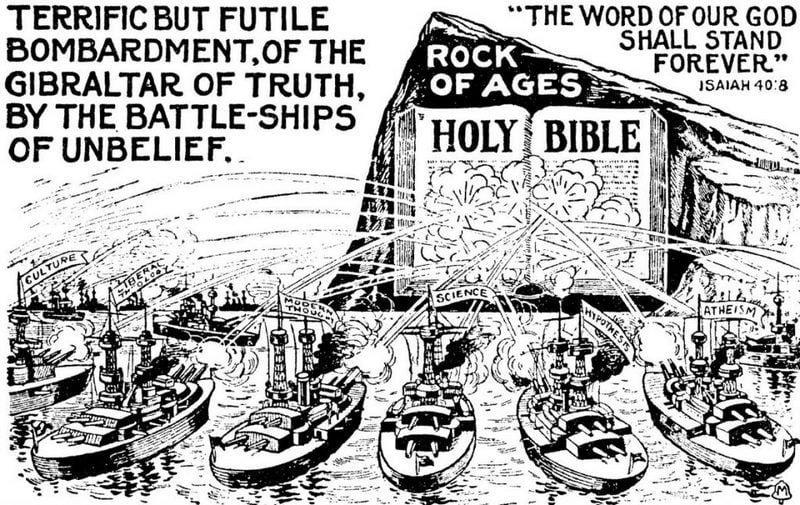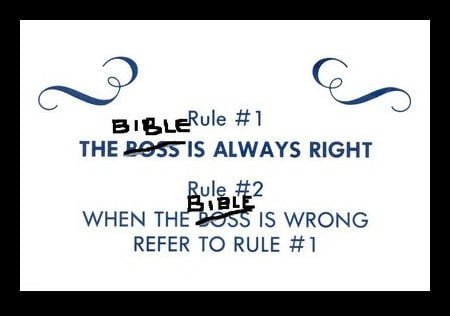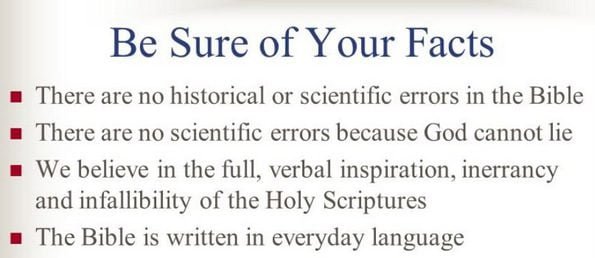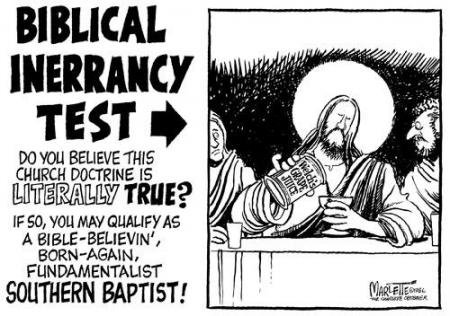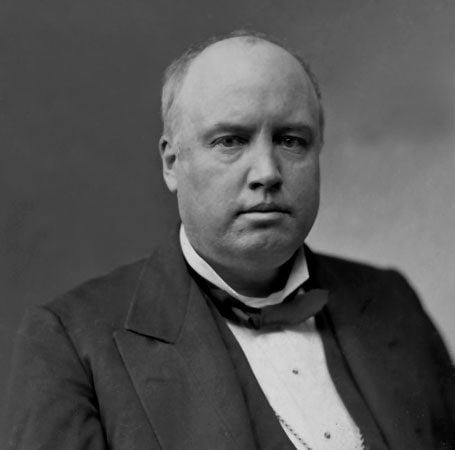
Several years ago, I followed and participated in a Facebook forum discussion about the move by Xperience Church (please see “We Accept Anyone No Matter What,” Local Evangelical Says) to an anchor store at the Northtowne Mall in Defiance, Ohio. The discussion was lively, to say the least. One common theme throughout the discussion was the need for Evangelical Christians to quote the Bible, either by itself or as proof for their assertions. This led, of course, to Evangelicals arguing amongst themselves about what this or that verse “really” meant. Just another day on Facebook, right?
Evangelicals enter public forums with several presuppositions:
- The Bible is the inspired, inerrant, infallible Word of God
- The Bible is THE book above all other books
- Every word in the Bible is true
- The Bible is NEVER wrong
- Doubting the Bible’s truthfulness is sin
- The words attributed to Jesus in the gospels were actually spoken by him
- The Bible presents a blueprint, manual, guideline for living
Armed with these “truths” about the Bible, Evangelicals wage war against anyone and everyone who disagrees with them. I am sure virtually every non-Evangelical reader of this blog has had a social media interaction with an Evangelical, and more likely than not, the discussion included the believer quoting the Bible. During the discussion about Xperience Church, one Evangelical took to preaching, complete with quoted Bible verses. When she said she was just engaging in friendly discussion, I replied, no, you are preaching. She responded, I only quoted one passage of Scripture. I replied, actually you quoted five Bible verses. She retorted, well most of them were paraphrases. While that was indeed true, for someone like me, it was easy to see that she was referencing specific Bible verses. In other words, she was preaching.
Evangelicals are encouraged to read, study, and memorize the Bible. Through Sunday services and various weekly meetings, Evangelical minds quickly become saturated with Bible verses. This saturation is so deep that Evangelicals often parrot Bible quotations without even knowing it. Taught that the Bible is the divine answer book for life, Evangelicals will often offer up this or that passage of Scriptures as THE answer to whatever is being discussed. No issue is beyond proof-texting. Sadly, Evangelicals think that by posting a “thus saith the Lord,” they are engaging in discussion, when in fact, they are little more than a parrot at the local pet store who repeats a handful of learned phrases.
Most Evangelicals fail to question or challenge the presuppositions their proof-texts are based upon. To quote my favorite Bible character, Lucifer, “Yea hath God said?” Is the Bible really the inspired, inerrant, infallible Word of God? Is the Bible really THE book above all other books? How can you be certain the Bible is NEVER wrong? How can you be certain the words attributed to Jesus are actually his? It is not enough to believe the Bible is a God-given supernatural book. Beliefs are not the same as facts or evidence. “Well, I believe these things by faith,” Evangelicals say. Fine, but why should I or anyone else accept what you are saying is true? If you cannot show that the Bible is what you say it is, why should any of us listen to a word you have to say? Personally, I am not willing to faith-it. I want facts, evidence, truth. Surely, Evangelicals “should” want the same.
I have been accused of being a Bart Ehrman fanboy. Maybe I am, or maybe, just maybe, his books are the single best way to disabuse Evangelicals of their beliefs about the Bible. If I can get an Evangelical to honestly and openly read several of Dr. Ehrman’s books, I know that it is likely that their sincerely-held beliefs about the Bible will crumble and crash to the ground. If Evangelicals truly seek “truth,” then they must be willing to lose their faith; or at the very least radically change their beliefs.
The Bible is not what Evangelicals claim it is. Educated Evangelical preachers know this, yet on Sundays they play make-believe, leading congregants to think that the Bible is the very words of God/Jesus. These preachers know this is a lie, but their identity and economic wellbeing are tied up in perpetuating this untruth Sunday after Sunday. They must not tell congregants the truth lest they find out the emperor has no clothes. Evangelical preachers know that if their charges question the purity and veracity of the Holy Bible, why, what’s next? Questions are the slippery slope that leads to liberalism and apostasy. For these preachers, better to lie than to cause people to lose their faith.
Years ago, I wrote a post about a dear friend and ministerial colleague coming to see me after he received Dear Family, Friends, and Former Parishioners. Titled, Dear Friend, I wrote:
I was also troubled by your suggestion that I not share my beliefs with anyone. You told me my beliefs could cause others to lose their faith! Is the Christian faith so tenuous that one man can cause others to lose their faith? Surely, the Holy Spirit is far more powerful than Bruce (even if I am Bruce Almighty).
I am aware of the fact that my apostasy has troubled some people. If Bruce can walk away from the faith…how can any of us stand? I have no answer for this line of thinking. I am but one man . . . shall I live in denial of what I believe, of what I know to be true? Shall I say nothing when I am asked about the hope that lies within me? Christians are implored to share their faith at all times. Are agnostics and atheists not allowed to have the same freedom?
My ex-friend viewed my story as a threat to the faith of others. To protect them, he asked me to keep quiet about my loss of faith. In other words, he asked me to lie or deceive people. In his mind, protecting the flock was far more important than “truth.” So it is with the nature and history of the Bible. Evangelical preachers, out of fear of burning everything to the ground, shelter their congregants from “truth.” Better for them to go to Heaven blissfully unaware of the truth about the Bible than to risk them turning into Bruce Gerencser. In their minds, the end (Heaven) justifies the means.
Sadly, most Evangelical preachers act like Jack Nicholson in A Few Good Men. Remember the dialog between Nicholson and Tom Cruise? Nicholson said, “you can’t handle the truth!” Is this not what Evangelical pastors say when they withhold the truth about the Bible from their congregations? Perhaps it is time for full disclosure, letting the chips fall where they may. Surely, the Christian God is able to protect his sheep from the wiles of an ex-Evangelical-preacher-turned-atheist or a book-writing professor. If he can’t, then perhaps it is time to question whether God is the all-powerful, all-knowing deity millions of American Evangelicals say he is. Perhaps, in the end, this God is just a character in a work of fiction.
Bruce Gerencser, 66, lives in rural Northwest Ohio with his wife of 45 years. He and his wife have six grown children and thirteen grandchildren. Bruce pastored Evangelical churches for twenty-five years in Ohio, Texas, and Michigan. Bruce left the ministry in 2005, and in 2008 he left Christianity. Bruce is now a humanist and an atheist.
Connect with me on social media:
Your comments are welcome and appreciated. All first-time comments are moderated. Please read the commenting rules before commenting.
You can email Bruce via the Contact Form.


